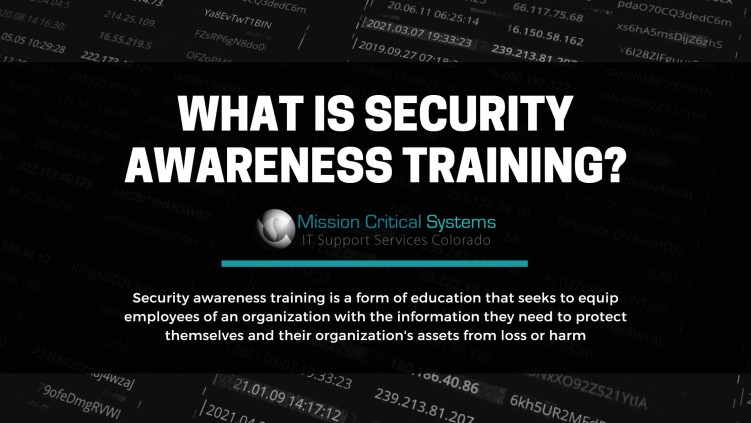Security awareness training is a form of education that seeks to equip employees of an organization with the information they need to protect themselves and their organization’s assets from loss or harm.
Security awareness training should include employees, temps, contractors, and anybody else who performs authorized functions online for an organization.
Small and Medium Enterprises can also benefit from training their employees to avoid cyber heists through phishing attacks, account takeovers, or other well-known means that cybercriminals use to misappropriate company funds.
To be aware, you need to be able to confront. Mission Critical Systems along with KnowBe4 helps employees confront the fact that cybercriminals are trying to trick them. Once they confront that, they become aware and able to detect these scam emails and can take appropriate action like deleting the email or not clicking a link.
Cybercrime is moving at light speed. A few years ago, cybercriminals used to specialize in identity theft, but now they take over your organization’s network, hack into your bank accounts, and steal tens or hundreds of thousands of dollars. Organizations of every size and type are at risk.
How To Run A Successful Program In For Your Employee
Critical Components of a Cyber Security Awareness Program
- Content – Content is king! As humans we all prefer different types and styles of content. Don’t approach content in your program as one size fits all. Match different content types to different roles in your organization.
- Executive Support & Planning – Materials that will help you continue to prove the value of the program to your executive team, and to show auditors/regulators that you are doing the right thing.
- Campaign Support Materials – A successful program shouldn’t be ‘one and done’, treat it as a marketing endeavor. Once-a-year, ‘check the box’ training will not work toward changing user behavior. Continuously presenting the information in different ways, when it coincides with the context of their life, is what will influence their decisions and make it EASIER for users to make smarter choices.
- Testing – People need to be put in a situation where they will have to make a decision that will determine if the organization gets breached or not. Phishing simulations prompt employees to either click a link, report the phish, or do nothing. You want to give them an opportunity to report phishing attempts and help the organization increase resilience. If they do fall for the phish, you want the ability to do training then and there to create a learning moment. Doing nothing isn’t ideal as it leaves the potential threat out there and there’s an opportunity for others in the organization to click.
- Metrics & Reporting – You need to be able to show you are closing security gaps. Reporting is also useful for optimizing campaigns based on past results. You want to be able to see what is working well and what can be improved upon.
- Surveys/Assessments – These types of tools can help you understand the attitudes of your organization and how well your program is resonating with your people so you can adapt. Think of it as a pulse check of subtle nuances that are different than metrics/reporting such as opinions, frame of mind, etc.
While an organization’s employees may be its most asset, they are also its largest risk. Most malware infections and data breaches occur through actions an employee takes, either inadvertently or on purpose. Mission Critical Systems along with KnowBe4 offers both training and testing for end users. Trainings include general cybersecurity best practices, recognizing insider threats, and how to spot phishing attempts. The testing portion includes recurring random phishing-like emails, “found” USB drives, and even phone-based vishing voicemails. The management console tracks each user’s progress in training modules and successes/failures in tests to provide a comprehensive view on risky.
As always, if you have any security-related questions, we are here to help! Just contact us, and we’ll be happy to assist you.
Content provided by Mission Critical systems and KnowBe4.






 FREE – Risk Assessment
FREE – Risk Assessment